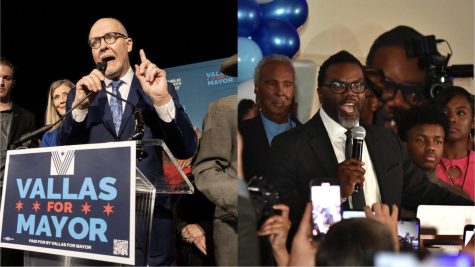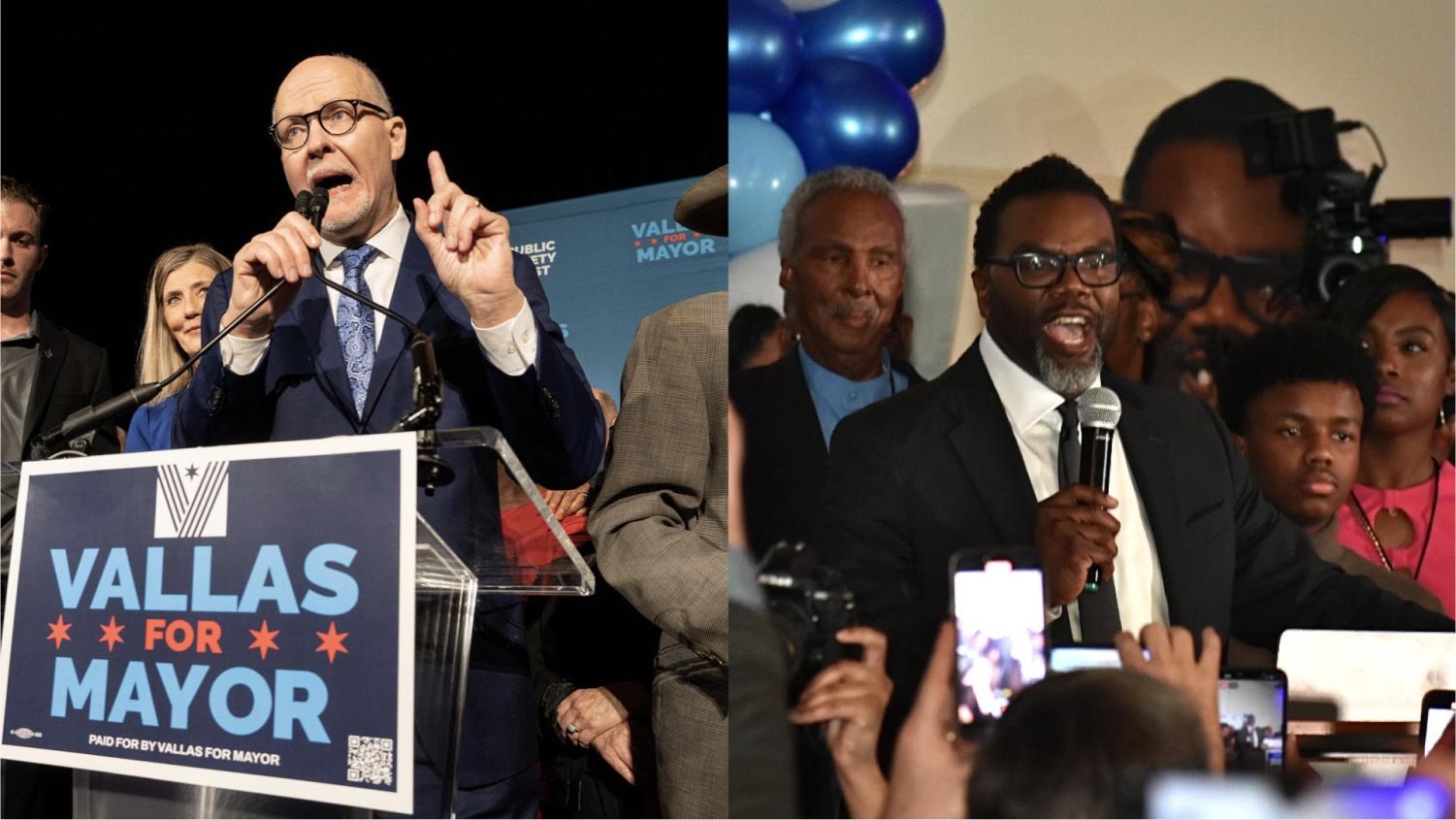Mayoral candidates try to distinguish themselves in first debate before runoff
March 8, 2023

2023 ELECTION
The first live debate between Cook County Commissioner Brandon Johnson and former CEO of Chicago Public Schools Paul Vallas was full of tension on Wednesday night.
With a little less than a month to go until the runoff election on April 4, the two candidates outlined their plans to address crime, increase affordable housing, stimulate economic development and increase enrollment in Chicago public schools.
Vallas and Johnson emerged as winners in a nine-candidate race on Feb. 28 that knocked out incumbent Mayor Lori Lightfoot.
According to the latest data from the Chicago Board of Elections, Vallas received 33 percent of the vote in the first election, while Johnson won 21.57 percent.
NBC 5 Political Reporter Mary Ann Ahern moderated the debate, which was hosted by NBC 5 and Telemundo. The two stations partnered with the Union League, the Urban League and Latino Policy for the one-hour event.
The Chronicle highlighted some of the questions and responses from the debate.
CPS has lost 82,000 students in the last decade. There are already empty school buildings. How will you address declining enrollment and what will you do with those underutilized schools?
Johnson: “One of the first things that we’re going to do is we’re going to implement the funding formula that I organized to make sure that it was actually part of state law. Right now, Chicago Public Schools is missing out on $1 billion because we are using an antiquated structure, but I’m also going to make sure that we are educating children in teaching Black history.”
Vallas: “We have tens of thousands of students who have exited a system, particularly when they were closed for 15 consecutive months with catastrophic consequences and they need to be reclaimed. There’s federal money available to state money available; there’s still COVID money available that [President] Biden has suggested be used for those very same programs.”
Officer suicides are up. How will you repair the broken relationship between the mayor’s office and the [Chicago Police] rank and file?
Johnson: “In order to repair trust within communities, we have to concentrate on making sure that mental health support services are available for the residents of the city of Chicago and mental health support is available for officers who are serving on the front line.”
Vallas: “First of all, by promoting leadership within who has the support and the respect of the command of the rank and file. Secondly, by putting police on a humane work schedule. Third, by not punishing the police when they are being responsive. And four, returning to beat integrity so police aren’t being moved around all over the city. And finally, providing the type of mental health intervention services that police officers need.”
NBC five investigates series “left for dead” revealed the scope of the city’s hit and run crisis and the Chicago Police Department’s low clearance rate in these crashes, just three of every 1000 were solved in 2021. Case after case showed that officers were ignoring seemingly obvious cases. How do you plan to hold police accountable for actually solving these crimes?
Johnson: “My public safety plan lays out why it’s important to actually hire and promote 200 more detectives because our clearance rate is abysmal. It takes 18 months to become a police officer under Paul Vallas’ plan. The city of Chicago would have to wait two years before they see an officer on the front line.”
Johnson said officers need to be held accountable and that “we need consistency,” also mentioning that his public safety planning ensures the promotion of 200 more detectives.
Vallas: “The first step towards holding police accountable is by promoting people in the position of leadership who have the respect of the rank and file and who know what accountability is, and there are individuals in this CPD who have that experience.”
Vallas said the lack of police officers is why cases are unable to be cleared.
As the cost of living rises each year, low income families have difficulty finding affordable housing. A DePaul University study says Chicago is short about 100,000 affordable housing units. As mayor, how will you alleviate the burden?
Johnson: “We’re going to pass Bring Chicago Home to raise revenue to focus on housing, but I’m also committed to not raising property taxes, because that’s what was done, $2.5 billion of property tax increase again because of the budgetary schemes of Paul Vallas. That’s why we are in this structural deficit right now.”
Johnson said he wants to eliminate “this structural deficit,” and over the next four years, make investments up to $1 billion. He would not raise property taxes.
Vallas: “The first thing you need to do is remove the obstacles to building affordable housing. And the buildings department is the human cul-de-sac. Secondly, you’ve got to lift the obstacles to doing conversions to unimproved space to garner use.”
Vallas said doing this will generate 100,000 additional spaces; vacant residential buildings need to be turned over to committee-based organizations for renovation so they can be reused.
Vallas said he wants to cap property taxes. “You’ve got to protect against gentrification because property taxes are driving families and businesses out of their homes.”
An estimated 65,000 Chicagoans are homeless, including more than 17,000 CPS students. What’s your plan to care for those impacted by housing insecurity?
Johnson: “We’re gonna pass bring Chicago home which is gonna raise millions of dollars to give what the residents of the city of Chicago deserve a guaranteed right to housing.”
His definition of Bring Chicago Home is “an ordinance that’s going to raise revenue to actually deal with those that are unhousing, affordable housing, public housing, a pathway to homeownership.”
Vallas: “Well, first of all, what you have to do is you have to inventory all the affordable housing and all the available housing that is there. There are documented thousands of CHA [Chicago Housing Authority] units that are empty. CHA seems to be operating out there on its own.”
Vallas mentioned again that vacant residential units need to be turned over, so these can become available to people who are homeless, victims of domestic violence and “things of that nature,” also calling for a city wide inventory to identify housing availability.
The narrative of Chicago as a tale to cities is indicative of the wealth gap that exists primarily between white residents and Black and Brown residents. If elected, what steps will you take to work towards narrowing the racial wealth gap in Chicago?
Johnson: “I’m gonna make sure that we provide down payment assistance to create generational wealth as a pathway to homeownership.”
Johnson said he will be “very specific” about workforce development to rehabilitate the homes that are vacant.
He said he wants to “put those homes back on the market, and then provide incentive for the childcare workers, teachers, security guards to actually purchase a home to create a pathway to generational wealth.”
Vallas: “Having a real South-West Initiative, an initiative that really invests long term in those hard pressed communities and basically I’ve talked about doing a number of things not only creating an Economic Development Authority that can be free of aldermanic privilege and and basically mural for floor politics.”
He said to have a “constant flow of hundreds of millions of dollars into the South and West sides,” he wants to create “a fair share Community Investment Fund” that receives shares from TIF monies, casino money, gaming money and video poker money.
He said he wants to have massive land banking. “On the South Side there’s four and a half square miles of vacant property that is not on the tax rolls.”
What about Mayor Lightfoot’s South and West Side development plan? Will you continue that effort? Where does that money come from?
Johnson: “Yes, I’m going to continue it but we’re going to expand it. We want to make sure that there’s real money that we actually get to participate, particularly Black folks, right.”
Johnson said it needs to be a community process so that the needs of the community are properly assessed.
Johnson said this is a “reimbursement program,” and is going to include micro grant funding, which is what he and his wife used to purchase their first home.
“We have to provide those types of incentives to give a jumpstart to these small businesses. Otherwise, it’s just smoke and mirrors. Under my leadership we’re going to make sure we’re investing in a real way with real money for community processes.”
Vallas: “Yes, I would but I would take the scale and institutionalize it as I’ve articulated.”
He suggested that the city could issue bonds, amortize the interest and financial bonds with TIF money.
Mr. Vallas, you stopped funding the city’s teacher pensions when you were the CPS CEO. Do you take responsibility for the current CPS pension crisis?”
Vallas: “No, not at all because what the legislature did was the legislature consolidated all the property tax levies into a single levy. But then they imposed a mandate requiring that the pensions be funded based on an actuarial based formula.”
Vallas said President Clinton called the city’s programs a model for the nation. “So it allowed us to use extra money when we had it to invest in the classroom.”
